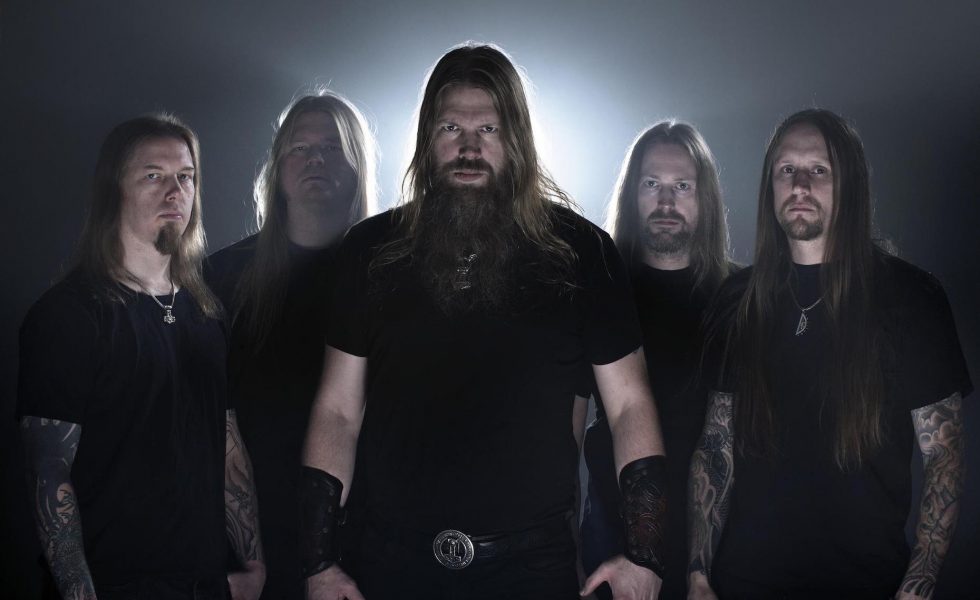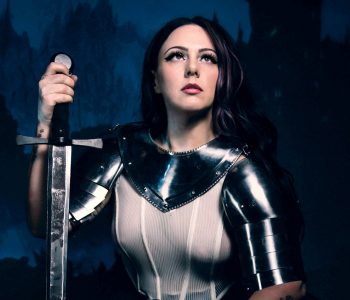Brisbane’s pop-punk upstarts Two Times Shy are soaring lofty heights as they let loose their …
In his 26 years as frontman for Amon Amarth, Johann Hegg has been witness to many memorable firsts.
“The one that comes to mind,” he reminisces, “We were, not like an up-and-coming band but a main act. It was the [first] 70000 Tons Of Metal–we were part of the first one. It exploded, now there are other cruises [like it] in the Caribbean as well.”
MORE: Dead Of Winter Festival 2018 First Line-Up Revealed // AFI – Dark Flames & Poisoned Hearts … Sing the Sorrow Turns 15 // THE BRONX – Heart Attack Americans … The Album that Brought Punk Back
The rumbling voice of this 21st century Viking murmurs excitement about the first Download Festival Australia and his joy at being a part of it. “I think it’s great–we were on Soundwave Festival a couple of years ago and you could tell there are a lot of fans in Australia who love going to festivals. Download is a huge festival in the UK and France and we’re really looking forward to it. It’s a great privilege, it’s a lovely country, lovely people.”
There’s another special marker this year for Hegg; the 20th anniversary of the release of the seminal album Twilight of the Thunder God, now a metal music staple. The reasons for its importance to the genre and why it’s still hugely popular today is something Hegg says he doesn’t really think about. “I’m really happy people still like it, you know? I think it’s a strong first album so from that point of view it’s very important–looking back there was a bunch of stuff we would have wanted to do differently but on the other hand, that’s where we were at in our career and I think we did a pretty good job!”
You might assume Amon Amarth were able to conquer those extra elements Hegg mentions in their subsequent releases but without a little probing, we’re only privy to responses by a Johann Hegg set to autopilot. “Of course, you learn something different from each album you record. Even the latest album there’s things where you go, ‘Yeah we should have’ done that. There’s always new things that come up that you wish you’d thought of when you recorded. That’s the way it is–all the brilliant ideas don’t come beforehand.”
If you look at the mythology and Old Icelandic sagas, they’re very fascinating stories and make for good lyrics. Powerful, aggressive, sometimes contemplative, sometimes grand, and I think it lends itself to dramatic metal music.
[ Johann Hegg ]
Beneath this rugged exterior of metal machismo, beneath these uniform responses by a man for whom interviews are old hat, is a meticulous musician, one who when thinking deeper about his music reveals arcane gradations. He touches upon the wonders of hindsight and as it turns out, there are areas within Amon Amarth’s 11 studio album output that Hegg still wishes could have gone differently. “I think one thing… it’s hard to say. I think we did the best out of each situation. If we had realised that using a producer would be a good thing, these [early] albums may have come out a little better. The songs are great but some of them could have been even better with an outside opinion on how to improve them.
“You get so invested in what you’re creating, if you change something or remove something or add something, it might be better but it’s hard to say, really. Usually small details, ‘This section here the lyrics should have been phrased this way,’ but the average listener wouldn’t know, it’s just me.”
Perfectionist tendencies aside, legends live on in Amon Amarth. Viking and Norse mythology arranged to the beat of melodic metal boldness is a sound that translates far beyond the boundaries of Scandinavia. Nations the globe over are in love with the mighty crash of the music and the epic sagas contained within–but the reason for all this popularity, Hegg cannot say. “That’s very difficult to answer.” Hegg breaks to ponder. Once he’s ready with his response, it’s nothing short of epic. “The stories themselves,” he begins, “If you look at the mythology and Old Icelandic sagas, they’re very fascinating stories and make for good lyrics. Powerful, aggressive, sometimes contemplative, sometimes grand, and I think it lends itself to dramatic metal music.
“On top of that I think there’s something about the Viking culture, the Viking heritage that appeals to a lot of people–an honour system. You are loyal to your friends and fierce to your enemies. There’s something deeply human about that, that we do need friends and family and it’s important to us and you behave honourably towards them. You’re fierce to your enemy but you also respect your enemy.
“Now, that sounds very harsh of course. You can translate that to today’s society by saying we don’t always agree on stuff and if you do agree, you have to respect this point of view. That doesn’t mean you have to get along with them. I think there’s something about that that resonates with people–being honest and honourable and loyal to your friends.”
Amon Amarth Play Download Festival This Weekend, Tickets Available Here.
Amon Amarth also play their own two headlining dhows below:
Sunday March 25, UNSW Roundhouse, Sydney NSW
Tuesday March 27, The Tivoli, Brisbane QLD





